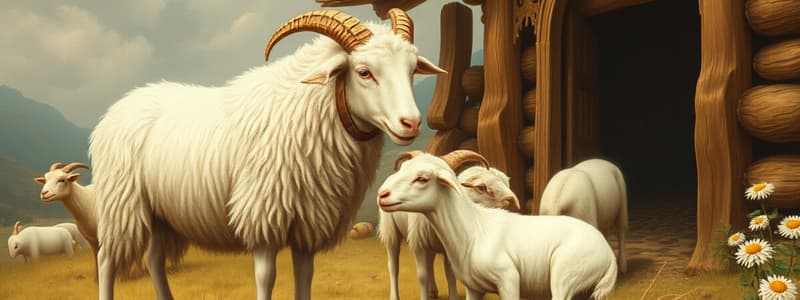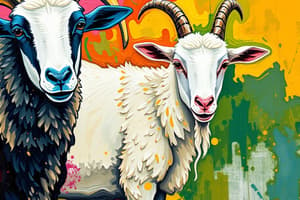Podcast
Questions and Answers
Which statement is not a reason for feeding sheep?
Which statement is not a reason for feeding sheep?
- For growth
- For maintenance
- For reproduction
- For hunting (correct)
What is a common symptom of Pulpy Kidney in young lambs?
What is a common symptom of Pulpy Kidney in young lambs?
- Death in young sheep in good condition (correct)
- Scratching and rubbing
- Excess saliva (correct)
- Blue tongue
Which type of feed is not typically required by sheep or goats?
Which type of feed is not typically required by sheep or goats?
- Natural pasture
- Complete rations
- Grains (correct)
- Fodder
Which of the following is a responsible prevention measure for Rift Valley Fever in goats?
Which of the following is a responsible prevention measure for Rift Valley Fever in goats?
What is a primary way to prevent Blowflies in sheep?
What is a primary way to prevent Blowflies in sheep?
Which symptom is associated with Sheep Scab?
Which symptom is associated with Sheep Scab?
Which factor is essential for the digestion of food in sheep and goats?
Which factor is essential for the digestion of food in sheep and goats?
What disease is characterized by a blue discoloration of the tongue in sheep?
What disease is characterized by a blue discoloration of the tongue in sheep?
Study Notes
Reasons for Feeding Sheep and Goats
- Feeding sheep is essential for maintenance, growth, production, and reproduction.
- Goat feeding primarily supports growth, production, and reproduction.
Types of Feeds Required by Sheep and Goats
- Natural pasture provides essential grazing material.
- Fodder serves as supplemental feed.
- Licks supply minerals and nutrients.
- Water is crucial for hydration and bodily functions.
- Complete rations ensure balanced nutrition.
Importance of Water
- Transports nutrients throughout the body.
- Regulates body temperature to maintain homeostasis.
- Facilitates excretion of waste products.
- Aids in the digestion of food for nutrient absorption.
Diseases Affecting Sheep and Goats
-
Sheep Scab
- Skin condition affecting sheep, transmitted via direct contact.
- Symptoms include scratching and rubbing against objects.
- Control measures: quarantine and dipping, treat new sheep prior to integration.
-
Pulpy Kidney
- Bacterial disease particularly dangerous to young lambs, worsens in winter.
- Symptoms: sudden death in healthy lambs, tiredness, red sclera, grinding teeth, excessive salivation.
- Prevention through vaccination of ewes before lambing and lambs after birth.
-
Rift Valley Fever
- Infectious fever affecting young goats.
- Symptoms: sudden deaths in kids, potential for abortions.
- Vaccination is the primary control measure.
-
Blue Tongue
- Viral disease affecting sheep, causing organ inflammation and a characteristic blue tongue.
Pests Impacting Sheep and Goats
-
Blowflies
- Lay eggs in damp wool around the tail, causing severe irritation.
- Symptoms: restlessness, tail swinging, stamping.
- Prevention includes docking tails and shaving to reduce contamination areas.
-
Nodular Worms
- Internal parasites residing in the intestines of sheep.
- Symptoms include weight loss, reduced appetite, and diarrhea.
- Control through dosing before moving to clean pastures and practicing rotational grazing.
-
Fleas
- Commonly found around the face and ears of sheep.
- Symptoms: formation of ulcers on the head and ears.
- Control includes dipping animals to remove fleas.
Studying That Suits You
Use AI to generate personalized quizzes and flashcards to suit your learning preferences.
Description
This quiz explores the essential aspects of feeding sheep and goats, including nutrient requirements and the significance of water in their diet. It also covers common diseases that affect these animals, highlighting their symptoms and control measures. Test your knowledge on best practices for maintaining the health and productivity of sheep and goats.




